home
Latest

Alexa can now provide traffic updates and severe weather alerts
Depending on where you live, traffic can be unpredictable, making it yet another thing to check while getting ready for work. Alexa should make planning your commute a bit easier with a new voice control skill. Just ask Alexa about your commute, traffic conditions or directions. You can also have that information sent to your phone. A notification will appear on your device -- tap that and your preferred map app will open with the route guidance. Google Assistant has done this for a while, but Amazon customers will likely enjoy the added convenience.

Get a Play:1 speaker for $99 in Sonos’ certified refurbished sale
Sonos has restocked its certified refurbished sale. While supplies last, you can get a Sonos Play:1 speaker for $99. And you can snag the Sonos Playbar for $499. That's $200 less than the recommended retail price.
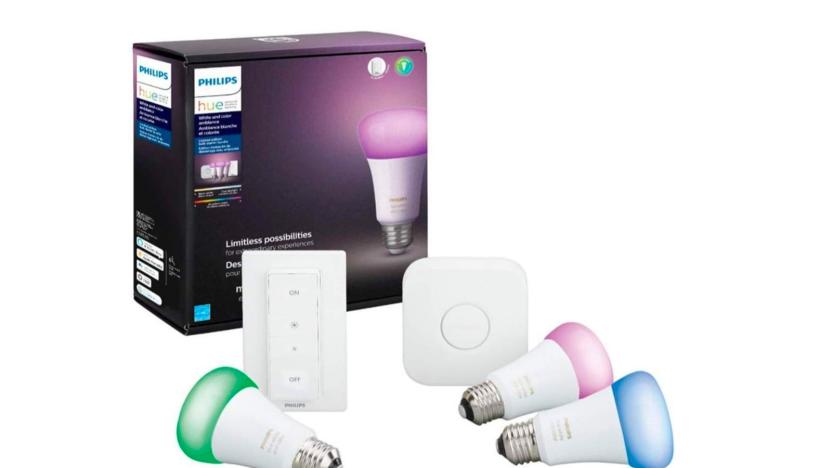
Dell’s cheap Philips Hue starter pack deal is even better with $50 credit
Philips Hue has become the go-to for smart home lighting. The LED light bulbs can transition between 16 million colors to compliment your home, set the mood or enhance your sleep. Those who haven't turned their home into a technicolor dreamland may want to check out Dell's latest deal on a Hue starter kit. It comes with three white- and color-capable bulbs, the Gen 3 Hue Bridge and a dimmer (which doesn't come with most bundles). The kit is $120 -- $35 less than Amazon's listing -- and comes with a $50 gift card so you can stock up on more Hue accessories like bulbs, light strips and motion sensors -- or Dell's computer products. If purchased separately, the items would cost $235, so this is a great deal even before Dell's discount and gift card.

The Morning After: Amazon's accelerated one-day shipping
Hey, good morning! You look fabulous. Amazon is offering faster same-day delivery that could get your order to you in a matter of hours. There will apparently be up to three million items marked "Today by" available to order for speedy same-day delivery to Prime members in Philadelphia, Phoenix, Orlando and Dallas. Amazon will even deliver packages while you sleep. Given the company CEO's recent comments on global warming and controversy over its contracted "delivery partners" it seems an odd service to announce. The orders will apparently ship from local fulfillment centers, meaning less air freight and reduced driving distance. Amazon says, "while it may seem counterintuitive, the faster delivery speeds enabled by these facilities actually help us lower carbon emissions." That is if your shopping list is entirely from local centers. We should take those better-for-the-environment claims with a pinch of salt, as the convenience of getting something to your door could outweigh a short walk to local stores or businesses; it could also lead to more frequent orders, more deliveries, more trucks. But if we're doing the ordering, Amazon can claim it's not its fault. Market forces at work. -- Mat
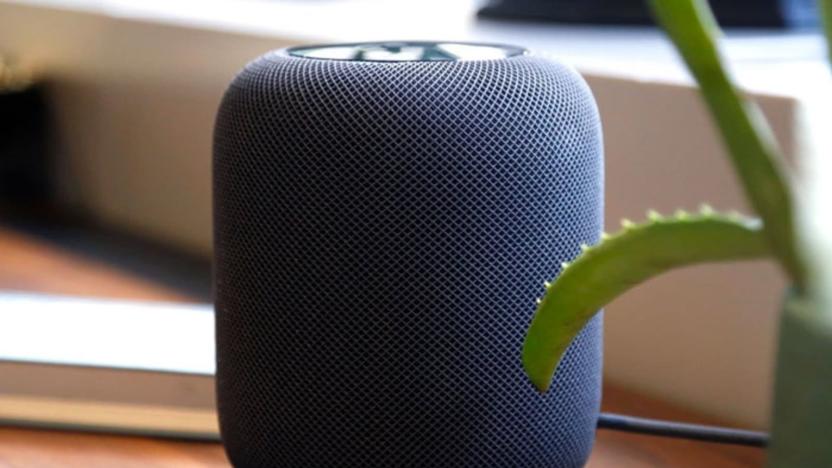
Apple's HomePod slashed to $200 at Best Buy
If you've been thinking about getting an Apple HomePod but missed Best Buy's hefty Black Friday discount back in November, you've got a second chance to get in on the action. The smart speaker is once again on offer for $200 -- that's a chunky $100 off the usual price. At that price, the device represents much better value for money – it's one of the best sounding smart speakers we've reviewed, and recent updates means it now comes with radio streaming and multi-user support. Plus, there are rumors (and they are just rumors at this stage) that Apple is thinking about relaxing its attitude towards third-party music apps on the HomePod, which could make it an even more attractive deal if you're concerned about Apple's often restrictive ecosystem.

Five small smart devices that can prevent major home damage
By Grant Clauser This post was done in partnership with Wirecutter. When readers choose to buy Wirecutter's independently chosen editorial picks, Wirecutter and Engadget may earn affiliate commission. Read the full blog 5 small smart devices that can prevent major home damage. I don't like surprises, especially the kind that cost me money. Our sump pump failed one winter during a flash thaw, but I didn't find out about it until several inches of water ruined the electronics, books, and furniture in our basement. I could have avoided that damage with a simple smart water-leak sensor, which would have alerted me to the problem early. If you're the kind of person who loses sleep worrying about home catastrophes, you can ease your anxiety with fairly inexpensive smart-home sensors that can detect small problems before they become big expensive ones. Smart-home sensors can be discreetly placed all around your house, don't require any expertise to use, and leave you with some peace of mind knowing that if mayhem strikes, you'll have enough time to act before it busts your repair budget. Some smart-home sensors can be set up by themselves, while others work best when integrated with Apple HomeKit or another smart-home hub like SmartThings or Wink, which let different smart-home devices work together. All can send notifications to your smartphone when triggered, and many work with smart speakers like the Amazon Echo or Google Nest Hub, letting you check their status just by asking or receive voice notifications through the speaker. Here are some of the smart-home devices we think are useful for most people:
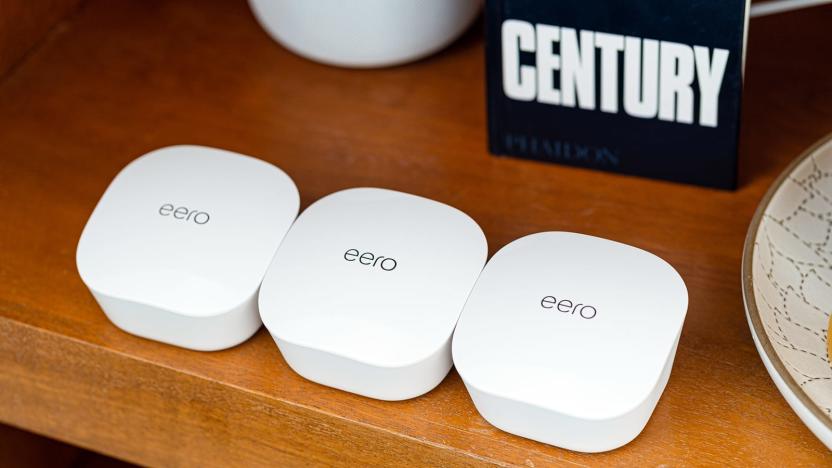
Eero's mesh WiFi routers now support Apple HomeKit
Eero has acted on its promise of supporting HomeKit for Routers. You can now add any Eero, Eero Pro or Eero Beacon device running eeroOS 3.18.0 (or later) to Apple's Home app, letting the mesh WiFi routers firewall your smart home devices so that a vulnerability in one doesn't compromise your entire local network. You can allow gadgets to communicate automatically with the devices their manufacturers approve, limit them to HomeKit or remove all restrictions if necessary.

Everything you missed at Toy Fair 2020
If you're a toy-loving child (and which kid isn't), your favorite times of year are birthdays and the big gift-giving holidays in December. If you're a toy-loving adult, however, your Christmas comes much earlier in the year, when all the companies announce their new stuff in February at the New York Toy Fair.
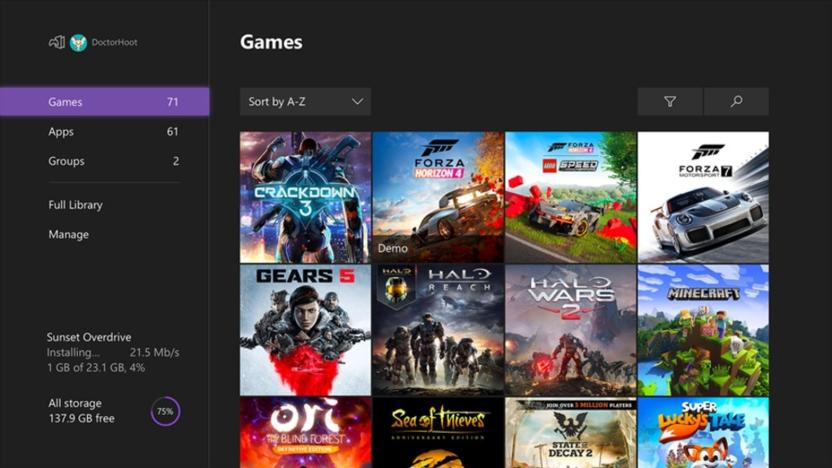
Xbox One gets another simplified dashboard redesign
Microsoft revealed last month it's been working on a whole host of changes for the February 2020 Xbox One Update, and now they're finally rolling out. The biggest change is yet another new Home interface -- so if you've got downloads set to install automatically you'll notice things are different as soon as it hits. Twists have been removed to make room for dedicated rows for Xbox Game Pass, Mixer, Xbox Community and Microsoft Store, and you'll be able to add or remove rows however you wish. Over in My Games & Apps, meanwhile, things have also been pared back for easier navigation.
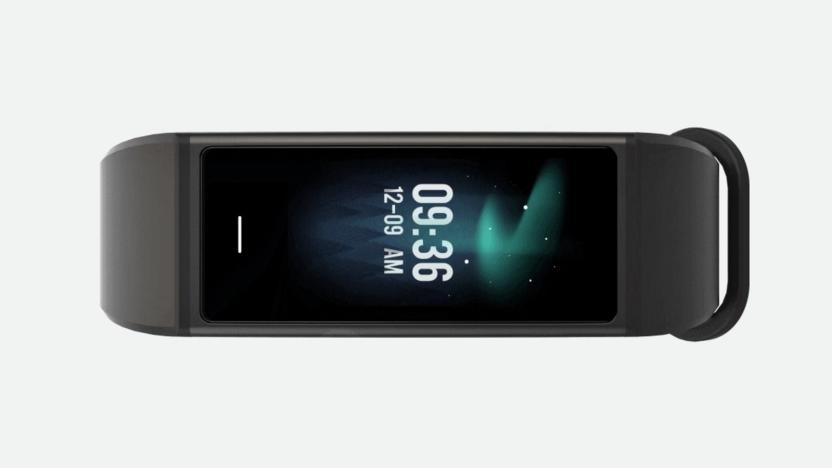
Wyze is working on a fitness tracker that puts Alexa on your wrist
Wyze initially made a name for itself offering home security devices for low prices, but a major data leak at the end of 2019 -- where the sensitive information of 2.4 million customers was exposed -- has put big question marks over its reputation as a security company. Nonetheless, Wyze seems determined to put its past transgressions behind it, and is working on a bunch of new products -- one of the more interesting of which is the Wyze Band with Alexa.
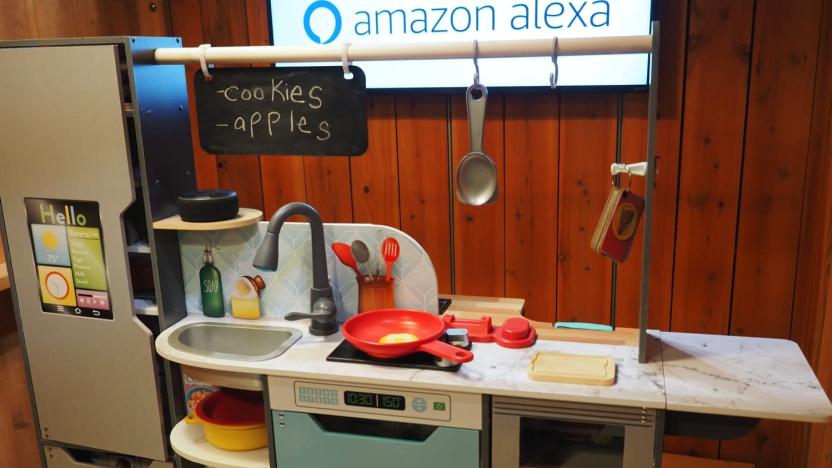
KidKraft's Alexa-powered toy kitchen sizzles and tells dad jokes
Kids love to cook — or at least to pretend to. They enjoy emulating their parents, especially when it comes to making delicious things to eat. However, our kitchen routines have changed a lot thanks to voice control technology, which isn't easily replicated in a basic wood or plastic playset. So KidKraft's new toy kitchen doesn't even try to emulate it. Instead, it integrates the real Alexa to create an incredibly realistic but also whimsical play cooking experience.

Hot Wheels brings its NFC-enabled stat-tracker to even more toys this year
For stats-obsessed kids, last year's release of Hot Wheels ID was a godsend. The NFC-based system let you scan your cars into the app to keep tabs on how fast and how far the cars in your collection had traveled. And it definitely solved the problem of figuring out who won a race. But it wasn't cheap, and there was limited compatibility with Hot Wheels' existing orange track system. In 2020 the brand has a few expansions in the works for Hot Wheels ID that should place it in reach for a lot more toy car racing fans.

Toronto rejects some of Sidewalk Labs’ smart neighborhood ideas
Sidewalk Labs will have to cede a little more ground on its vision for Quayside, a planned smart neighborhood in Toronto. The company, which is owned by Google-parent Alphabet, published a draft version of its Master Innovation and Development Plan (MIDP) last June. The technical document, which spans four volumes and almost 1,000 pages, is packed with proposals for how the district should be designed, funded and governed. Waterfront Toronto, a tri-government organization spearheading the city's lakeside overhaul, has now completed a technical evaluation of the draft MIDP, which will help its board decide whether to approve the project or sever ties with Sidewalk Labs entirely.
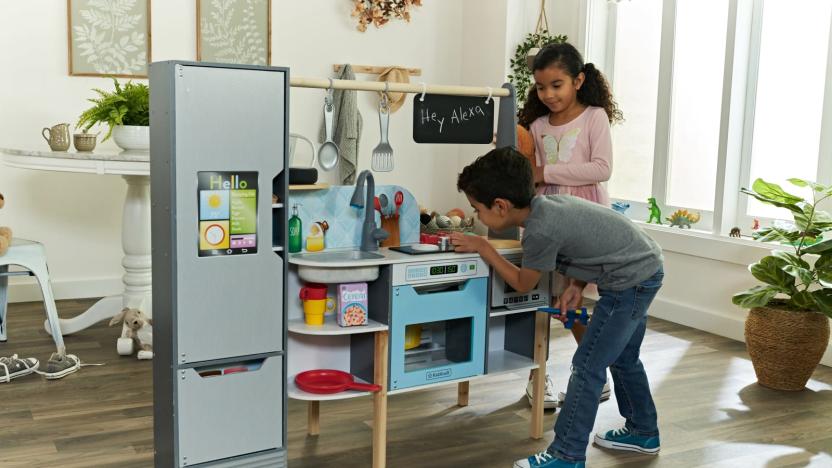
For $300, you can get an Alexa-powered kitchen for your kids
Alexa and other smart speakers can be especially useful in the kitchen, and toymakers are taking note. Today, KidKraft revealed its Alexa 2-in-1 Kitchen and Market. At first glance, it looks like your average play kitchen, but it comes with smart-chipped food, cookware and character cards that prompt a response from Alexa.

If you bought Flywheel's home bike, you can trade it in for a free Peloton
One of Peloton's biggest competitors, Flywheel Sports, announced today that it is shutting down its online classes. The company sent an email informing its users that it would stop its Flywheel At Home service effective March 27th 2020. The bikes can still be used of course, but without the live and on-demand coaching, which makes them not much better than ordinary stationary bikes. Peloton, however, is offering a deal where Flywheel customers can turn in their bikes in exchange for a "like-new" Peloton bike at no cost to them, though they'd still have to pay Peloton's monthly subscription fee.
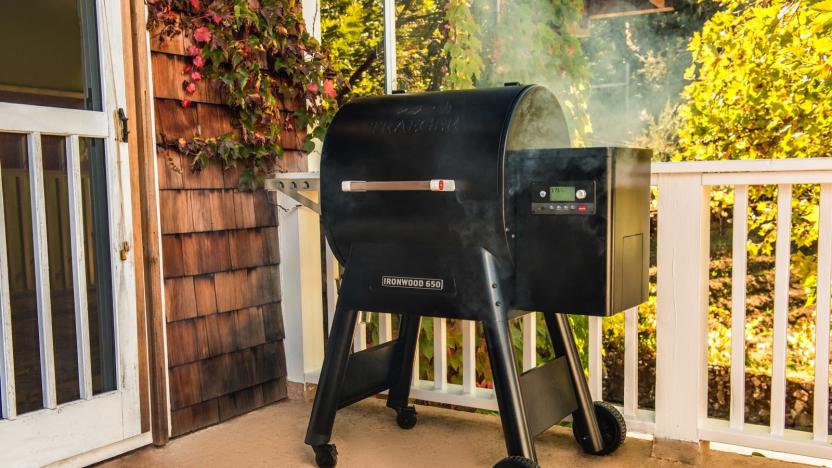
Traeger's Ironwood smart grills now ship with a handy pellet supply sensor
If Traeger's Ironwood series caught your eye, the company is now including a handy feature in the box, rather than making it a separate purchase. Traeger is now shipping its WiFi-equipped Ironwood 650 ($1,200) and Ironwood 885 ($1,500) pellet grills with the pellet sensor add-on that it announced in November. Until now, you had to pay $80 to get one of these for your backyard barbecue machine. And, sadly, if you own one of the 2019 Pro Series grills, you still do.
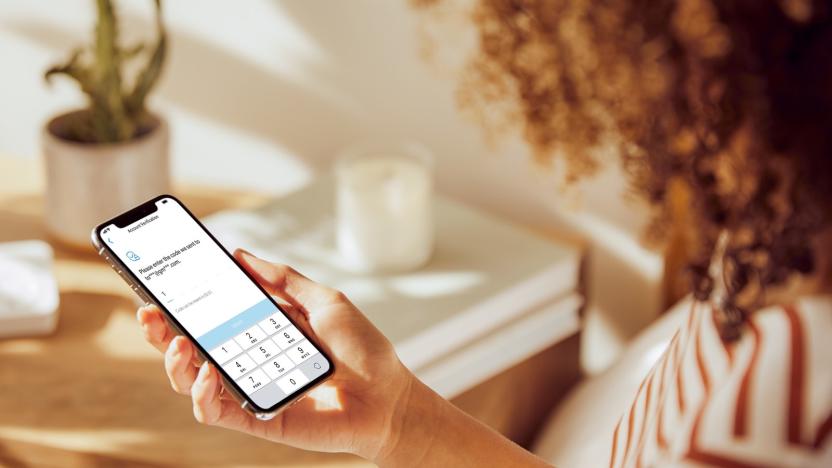
Ring now requires two-factor sign-ins for its home security devices
Ring is continuing its bid to improve privacy and security after facing criticism. As of today, the Amazon brand will start requiring two-factor authentication for all users when they sign into their Ring accounts. When the feature reaches you this week, you'll always get a six-digit code sent to either your email or (less recommended) SMS in order to complete the login process. This move will seem more than a little familiar when Nest announced a similar requirement just a week earlier, but it's still good news when it promises to raise the baseline security for Ring's smart home devices.

Samsung offers at-home Galaxy S20 trials to mitigate impact of coronavirus
As the spread of coronavirus continues to keep people in quarantine and threaten promotional tech events, companies in Asia gearing up for low sales -- but Samsung's new home visit service aims to mitigate some of this fall out. Reuters reports that the company is offering a smartphone delivery service to allow customers to test its new products without having to visit a physical store.

The best smart locks
By Jon Chase This post was done in partnership with Wirecutter. When readers choose to buy Wirecutter's independently chosen editorial picks, Wirecutter and Engadget may earn affiliate commission. Read the full guide to smart locks. Your front door lock is an unsung hero, quietly keeping thieves and rogues at bay. Smart locks are the superheroes of the species, with special powers that make life more convenient (and a little more fun). The Yale Assure Lock SL (YRD256) Connected by August is our top pick as it comes closest to hitting the sweet spot of convenience, security, reliability, and good looks. It's fast, quiet, and completely keyless, and unlike with other models, its sleek, slim, glass-and-metal housing is stylish. The Yale Assure Lock SL (YRD256) combines the hardware-security chops of Yale with the smart-home finesse of August. It connects to your Wi-Fi network (via the Connect bridge), allowing you to control the lock and manage access codes remotely. This ability to manage or even create new codes on the fly makes the lock especially suited to owners of vacation homes and short-term rental properties. The included August module makes the lock widely compatible with Alexa, Google Assistant, Siri, HomeKit, and other smart gear. Unlocking it is simple, and its mechanism is far quieter than that of nearly every other lock we've tested. We also like the DoorSense accessory, which tells the lock if the door is open so that the deadbolt doesn't engage before it's shut. Although we greatly prefer the feel of the keypads found on Schlage locks, the Yale Assure Lock SL's other features, reliability, and overall aesthetics make it a far better buy for most people. If your door is a single-hole model—that is, with a doorknob or lever and no deadbolt—the Yale Assure Lever (YRL256) is the one to get. It offers features identical to those of the deadbolt version, with a couple of minor differences; for instance, you can wake the lock or have it lock when you're leaving simply by pressing the Yale logo. We tested it on an internal door for several months, and we love how quiet it is. One extremely important note: The Yale Assure Lock SL has no keyway—should its electronics ever fail or its mechanism jam, you would be locked out of your home and would have to destroy the lock to get in. (Yale also sells a version with a built-in keyway, which we do not recommend—see How we tested for more details.) As such, we recommend this lock only if you have ready access to another entrance, such as a back door or a garage. If you prefer to have traditional key access to fall back on, we strongly recommend going with another pick. The Ultraloq U-Bolt Pro matches or exceeds the Yale Assure Lock SL in some ways, and it missed the top spot due to only a few minor performance flaws as well as its narrower compatibility with other smart-home devices and the fact that the company is a relative startup. Still, by any standard it is a wonderful device, with the cleanest, most precise hardware we've ever tested and a pleasing low-profile design. You can unlock it six different ways, including with a numerical code, in an app, through a physical keyway, and—the pièce de résistance—via fingerprint. (We highly recommend buying the $50 add-on Ultraloq Bridge, which allows for remote programming and control.) The companion app you use to set up and control the U-Bolt Pro is less polished and reliable than the August app, and we found that it sometimes required a restart to get back in sync. Although we believe the feel and function of the U-Bolt Pro's rubber number buttons to be superior to pecking numbers on the glass screen of the Yale Assure Lock SL, the fingerprint unlock was our preferred way to unlock this model. Unfortunately, it balked on around 20 percent of our attempts to unlock it using this method, and that required us to make multiple finger presses or to resort to using a key code. We hope this is something that the company can improve, since the fingerprint feature provides the best balance of security and convenience. The U-Bolt Pro is compatible with Amazon Alexa and Google Assistant, but unlike the Assure Lock SL it doesn't work with Apple HomeKit or Samsung SmartThings—if that doesn't matter to you, the U-Bolt Pro may be the better pick. The Schlage Encode Smart WiFi Deadbolt is a trimmed and toned update to similar previous picks, the Schlage Connect and Schlage Sense, but with the clever ability to connect directly to your Wi-Fi without the need of a plug-in adapter. (Most smart locks, in contrast, use battery-friendly Bluetooth and then connect wirelessly to a plug-in adapter that allows them to connect to your Wi-Fi and accept remote control.) That capability is appealing, and along with the nicely designed hardware—which also includes a built-in impact alarm—it makes the Encode one of the easiest models to install and one of the simplest smart locks to use of those we've tested. In gaining its smaller internal housing, the Encode unfortunately shed compatibility with Apple HomeKit, though it can still integrate with Amazon Alexa or Google Assistant. We tend to prefer the feel of capacitive keypads like the Encode's over that of a glass touchscreen, and we think that feature makes this lock less fussy to use, so it's an especially good choice for rental properties. If you are a renter who isn't allowed to change locks (or a homeowner who doesn't want to), the third-generation August Smart Lock is a wallet-friendly addition to an existing deadbolt. Unlike our other picks, which require replacing all the elements of your door lock, this August model lets you keep your deadbolt and keyway and swap only the thumb-turn mechanism on the inside of the door. When you have the Smart Lock on its own, you can set it to unlock when you approach the door and to relock after you close the door (thanks to the included DoorSense magnetic sensor), but you can also control it with August's smartphone app or the August Apple Watch app via Bluetooth. An optional adapter (the $70 August Connect) is required if you'd like to control the lock when you're not home, and it enables voice control through Alexa and Google Assistant (unlike other models, this August lock is not HomeKit or Siri compatible). The August is surprisingly noisy in operation, and in our testing of the automatic unlock feature, we experienced occasional delays or outright failures to trigger, sometimes requiring use of the app to unlock the door. We think this issue is highly dependent on the specifics of the install environment and therefore can be lessened with troubleshooting and recalibration.

Ring footage might not be very useful for catching criminals
Ring has said that camera footage sent to police can help reduce burglaries and catch criminals, but how effective is it, really? It might not be as helpful as you might think. NBC News has conducted an investigation suggesting that Ring's video doorbells and security cameras haven't been of much use to at least some police forces. Of the 40 law enforcement agencies the news outlet reached, just 13 said they'd made arrests after reviewing Ring footage, while two offered rough estimates. The remainder either made zero arrests (13 agencies) or didn't know how effective Ring had been despite partnerships that had lasted more than a year.








